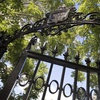{shortcode-d03d22b15d198aee9c6de7a0f5379a22854c31f5}
Commercialization is slowly pricing the charm and history out of America’s cities, and Cambridge is no exception.
A quick walk down Massachusetts Avenue only confirms this reality. You’ll pass by a Starbucks, a Blank Street, and a Pavement Coffeehouse. Walk towards the Charles River and you’ll come across a Blue Bottle and a Dunkin. Where small, locally owned shops with ample seating and regular events once flourished now lie a slew of fast-casual Mexican restaurants, coffee chains, and clothing retailers.
But something much quieter and much more sinister has overtaken the streets beyond our iron gates: the death of community. Students are not only losing a “third place” to talk to each other, they’re also losing a space to connect with Cambridge itself.
Let me take you back in time. The late 1950s and 60s was a time of revolution in the Square. Folk singers like Joan Baez and Bob Dylan played at coffee shops and nightclubs that have long disappeared. Songs promoting world peace quickly translated to protests, and anti-war, anti-establishment students and locals alike took to the streets of Cambridge to call on the government to meet their demands.
Now, the Square barely resembles its days of progressivism and rebellion. Copy-and-paste chains are overtaking small businesses like wildfire. Our perspective of the city is quickly becoming limited to how far we can see across a cash register or mobile order pick-up counter.
The problem of commercialization in the Square is nothing new. A 1972 Crimson article complained of the onslaught of modernized office buildings and chain establishments turning Harvard Square from a haven for political activists and creatives to a profit-hungry tourist attraction. And in 2011, The Crimson chronicled the Square’s growing shift from a neighborhood to a business hub as mom-and-pop shops slowly became unable to afford rising rents.
When Covid-19 hit, some of the last local coffee shops, Café Pamplona and Darwin’s, closed, and, with them, the Square’s last chance to connect Harvard to Cambridge. Now, despite its bustling intersections, throngs of tourists, and constant construction, the Square is a graveyard.
This purge has an even more frightening impact: the decline in political activism. Since its founding, Harvard Square has been a place where radical voices – from Revolutionary War patriots to Civil War-era abolitionists – assembled and organized. Moreover, cafes have long been meeting places for those on the fringe — the socially progressive, the politically alienated, the culturally estranged.
Even today, in neighborhoods as close as Porter Square and Central Square, local businesses host and advertise events like concerts, book festivals, and craft workshops. Just a few weeks ago, I witnessed two customers sitting next to me transform within minutes from strangers to friends as they discussed the Trump administration and the future of their grandkids’ education.
Such community centers — and political conversations — are virtually impossible to find in the corporate wasteland of the Square.
While third places are hardly political action groups, their value is easy to underestimate. In Nazi Germany, Hitler cracked down on informal public gatherings, fearing the congregation of political opposition. In monarchical Sweden, officials banned coffeehouses, convinced that they were centers of dangerous revolutionary thought.
The best way to stop community organizing isn’t by bringing in police, pepper spray, and handcuffs — it’s by dissolving the community itself. Whether it be cafes with little seating or restaurants with to-go only container options, Harvard and Cambridge are losing their connection to one another.
And with Harvard’s recent crackdowns on protests deemed “disruptive” to University life, even on-campus organizing is disappearing right before our eyes.
Right now, Harvard is at an inflection point. Billions of dollars of funding for higher education is on the Trump administration’s chopping block. Diversity, equity, and inclusion policies have transformed from an obligation of universities to a target on their backs. On top of all that, fears of nationwide economic collapse loom.
Now more than ever, Harvard affiliates and Cambridge residents need a space to take collective action.
In times of political instability and social unrest, Harvard and Cambridge were once united. Students, faculty, and locals organized to protest everything from abusive landlords to the Vietnam War. And the Square was their home base. While this phenomenon might sound more idealistic today, Harvard and Cambridge have already expressed recent interest in an alliance: The two groups protested alongside each other over the war in Gaza last April, and are protesting again this Saturday.
As a university renowned for intellectual discourse and cutting-edge research, we should not exist as an isolated echo chamber or apolitical island, but rather an institution that actively engages with our local community and our world.
We should disrupt the status quo, not maintain it.
So, I ask Harvard students to take a page from our 1960s playbook. Our neighbors are a source of mutual strength and empowerment. While we cannot reverse commercialization, we can begin to think critically about the choices we make — with our wallets and our voices.
Sylvia A. Langer ’28, a Crimson Editorial comper, lives in Wigglesworth Hall.
Read more in Opinion
Putting Academics First Starts With All of Us












